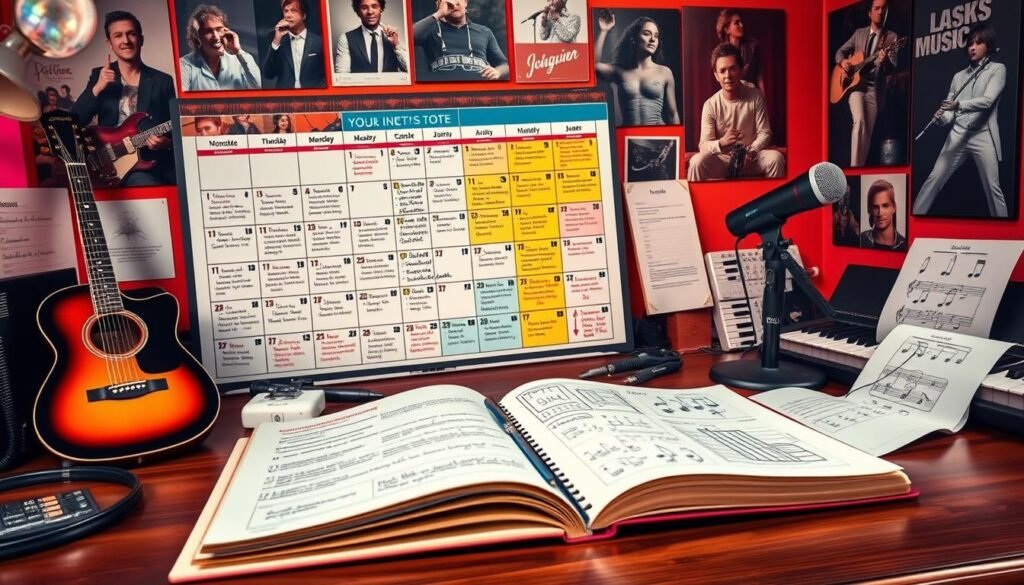Setting music career goals can seem overwhelming, but it’s key for lasting success. Dreams are great, but goals must be clear, chosen wisely, and measurable. This guide will show musicians and DJs how to set the right goals and achieve them.
Also Read: Essential Tips For Effective Music Career Planning
It’s important to focus on actions you can control, not just results. The guide will help you break down big dreams into smaller steps. You’ll learn how to pick the right goals, track your progress, and adjust them as needed. By setting music career goals, you can steer your music industry path and boost your chances of long-term success.
Key Takeaways
- The recommended range for setting carefully selected music career goals per year is between 1-3 goals.
- Setting lead indicators as goals in music production can increase control and adjustment flexibility compared to lag indicators.
- The SMART method for setting music career goals emphasizes making goals Specific, Measurable, Attainable, Relevant, and Time-bound.
- It is advisable to review and adjust music career goals regularly to align with actual progress and circumstances.
- Goal-tracking for music career goals requires daily focus on lead indicators and monthly reflection to assess progress towards yearly goals.
Understanding the Difference Between Dreams and Goals in Music
To succeed in music, you need more than dreams. You must set clear, measurable goals. Dreams inspire us, but they lack the strategy to make dreams come true. Goals, on the other hand, guide us and keep us focused on our path.
Also Read: How To Make Money With An Online Music Careers?
Defining Clear Musical Objectives
In your music career, setting specific goals is key. These could be producing an EP every quarter, sending tracks to record labels, or playing gigs monthly. Clear goals help you track your progress and make smart decisions for your music career objectives.
Setting Measurable Targets
Good goal-setting means setting measurable music goals. This could be writing a certain number of emails daily, saving for career investments, or practicing for a set number of hours. Checking your progress regularly helps you stay on track and adjust as needed.
Avoiding Common Goal-Setting Pitfalls
A big mistake in goal-setting in music is setting vague goals. Instead of dreaming about big labels, focus on the steps to get there. This includes making quality music and building industry connections. By avoiding these mistakes, you build a strong foundation for your music career.
“Dreams are important, but goals are essential in achieving them. Dreaming big is crucial, but without a clear plan and measurable targets, those dreams will remain nothing more than wishful thinking.” – Gok Wan, Fashion Designer and TV Personality
Music Career Goals: Creating Your Strategic Foundation

Building a strong foundation is key to success in the music world. Instead of just dreaming, break down big goals into smaller, doable steps. This way, you can move forward steadily and stand out in the competitive field.
Also Read: Top Music Career Tips For Beginners
First, set clear, achievable goals that fit your strategic music career planning. Use the SMART method to make sure your goals are Specific, Measurable, Attainable, Relevant, and Time-bound. These goals might include improving your music skills, networking, or getting music on labels.
Then, focus on what you can control, not just the end results. For example, if you want to get music on a certain label, start by building relationships with artists there. Also, work on getting press coverage and release music on smaller labels first.
- Invest in music industry success with affordable online courses on Udemy and Coursera. These can help you improve in music production and marketing.
- Use niche social media ads to reach your audience effectively.
- Work with micro-influencers in your field for a cost-effective marketing strategy.
- Create content on social media to connect with your fans.
- Go to local gigs and events to meet people in the music industry.
By building a solid foundation for your music career, you’ll be ready for the ups and downs of the industry. A successful music career takes time, so be patient and keep your focus on your strategic music career planning.
“The pandemic has shown us the importance of using technology, being flexible, connecting online, and learning entrepreneurial skills for a lasting music career.”
Developing a Time-Bound Action Plan

As a music artist, making a detailed action plan is key to reaching your career goals. Break down big goals into smaller daily music tasks and weekly routines. This helps you move closer to your dreams step by step.
Also Read: Starting A Music Career: Essential Steps To Take
Breaking Down Long-Term Goals into Daily Tasks
First, figure out your big music career action plan. Maybe you want a record deal, a national tour, or a hit album. Then, split these big dreams into smaller, doable steps. This might mean setting aside time for music making, networking in the music industry, or making a list for song submissions.
Creating an Effective Practice Schedule
Regular practice is the base of a successful music career. Make sure to schedule time for improving your skills, like songwriting, playing an instrument, or singing. See these practice times as must-do activities to keep improving.
Building Professional Relationships and Networks
Getting around in the music world needs a strong network of people in the industry, collaborators, and fans. Set goals for meeting new contacts, going to music events, and building real connections. These connections can lead to new chances, collaborations, and advice from experts.
-
- Write 10 high-quality original songs
- Produce a 7-song EP
- Create a professional music video
- Research and identify 20 potential record labels
- Reach out to 10 A&R representatives
- Perform at 5 industry showcases
| Goal | Timeframe | Action Steps |
|---|---|---|
| Secure a record deal | 3 years |
By making a detailed music career action plan, breaking down goals into smaller tasks, and practicing and networking regularly, you’re on the path to making your musical dreams come true.
Tracking Progress and Maintaining Momentum

Keeping up with your music career goals is key. Make sure your goals match your current situation. Use monthly goal-tracking to stay on track. This means checking how many songs you’ve made, emails sent, or events you’ve attended.
Also Read: Exploring The Best Music Career Paths For Beginners
Tracking your daily tasks is also helpful. Use a spreadsheet to see how you’re doing each month. If your goals change, be ready to update them. Celebrate your small wins to keep going. Remember, staying consistent is vital for lasting success in music.
- Regularly review and adjust your goals to stay aligned with your current reality
- Implement monthly goal-tracking to monitor progress on key metrics
- Use a goal-tracking spreadsheet to compare performance over time
- Adjust goals as needed to ensure they remain relevant and achievable
- Celebrate small wins to stay motivated and maintain momentum
By tracking your music career progress and keeping momentum, you’ll handle the music industry’s ups and downs better. For long-term success, consistent goal tracking for musicians is crucial.
“The road to success is paved with consistency and dedication. Stay focused on your goals, and the results will follow.”
Also Read: Boost Your Music Career Growth : Tips For Success
Conclusion
Setting and chasing meaningful goals is key to lasting success in music. The artists in this study saw themselves as entrepreneurs. They worked hard on promotion, sales, marketing, networking, and financing to grow their music careers.
They found sales, marketing, operations, and finance to be essential for their music businesses. Marketing was seen as a vital factor for their success by all. They also agreed that having multiple income streams was important for financial stability.
Understanding the value of record companies was seen as crucial for growing their businesses. However, finding a balance between their art and business skills was a big challenge. This shows how music careers require a wide range of skills to succeed.
FAQs
Q: What are the first steps to set goals for your music career?
A: To set goals for your music career, start by clarifying what you want to achieve. Outline a clear set of goals that are realistic and attainable. Consider using the SMART goal framework to ensure your goals are specific, measurable, achievable, relevant, and time-bound.
Q: How can I create SMART goals for musicians?
A: Creating SMART goals for musicians involves defining goals that are Specific, Measurable, Achievable, Relevant, and Time-bound. For example, instead of saying “I want to get better at music,” a SMART goal would be “I want to write one new song per month and share it on Spotify by the end of the year.”
Q: Why is it important to set achievable goals in the music business?
A: Setting achievable goals in the music business is crucial because it helps you maintain motivation and focus. By having a clear set of goals that you can realistically work towards, you’ll be able to measure your progress and make adjustments as needed to reach your ultimate aspirations.
Q: What are some examples of goals for your music career?
A: Examples of goals for your music career might include releasing a new album, gaining a certain number of Spotify subscribers, performing at a specific venue, or reaching a milestone in monthly streams. It’s important to align these goals with your passion for music and your long-term vision.
Q: How can I measure my progress towards my music goals?
A: You can measure your progress by setting milestones and deadlines for your goals. For instance, track the number of songs completed per month, the growth of your social media platforms, or your Spotify streams. Regularly reviewing these metrics will help you stay accountable and motivated.
Q: What mindset should I adopt when setting goals for my music?
A: Adopting a growth mindset is essential when setting goals for your music. This means viewing challenges as opportunities for growth and understanding that achieving your goals will require effort, dedication, and the willingness to learn from setbacks.
Q: How can accountability help me in achieving my music goals?
A: Accountability can significantly enhance your chances of achieving your music goals. Consider sharing your goals with a friend, mentor, or music producer who can provide support and encouragement. Joining a community or participating in a podcast can also keep you motivated and on track.
Q: What is the best way to stay on track with my music goals?
A: To stay on track with your music goals, create a plan that outlines your action steps. Set actionable tasks to complete each week or month, and make adjustments as necessary. Regularly reviewing your progress will help you move the needle toward your ultimate achievements.
Q: How often should I review my music career goals?
A: It’s best to review your music career goals regularly, ideally on a monthly or quarterly basis. This allows you to measure your progress, adjust your strategies, and ensure that your goals remain relevant to your evolving aspirations in the music industry.
Source Links
- https://pickyourself.com/music-career/goal-setting/
- https://plus.pointblankmusicschool.com/new-year-new-goals-a-musicians-guide-to-setting-and-achieving-successful-goals/
- https://turnuptoeleven.com/smart-goals-for-musicians/
- https://www.liz-taylor-consulting.co.uk/index.php/2020/12/18/the-difference-between-goals-and-dreams/
- https://thespinningthoughts.com/2017/10/04/how-to-make-your-dreams-come-true-as-a-musician/
- https://routenote.com/blog/invest-in-your-music-career/
- https://majoringinmusic.com/is-music-still-a-viable-major-and-career-plan/
- https://caricole.com/your-music-career-how-to-build-an-action-plan-that-draws-opportunities-to-you/
- https://medium.com/@seo1.delivermytune/the-power-of-strategic-planning-in-your-music-career-ecaafe46cf01
- http://www.makemusic.com/blog/using-smart-goals-to-achieve-musical-excellence/
- https://www.aarondavison.net/blog/7-ways-to-maintain-your-passion-for-music
- https://www.planetarygroup.com/staying-motivated-and-focused-on-long-term-career-goals/
- https://ursuladedekind.com/2020/12/04/conclusions-for-the-music-entrepreneur/
- https://academic.oup.com/book/8480/chapter/154309558




